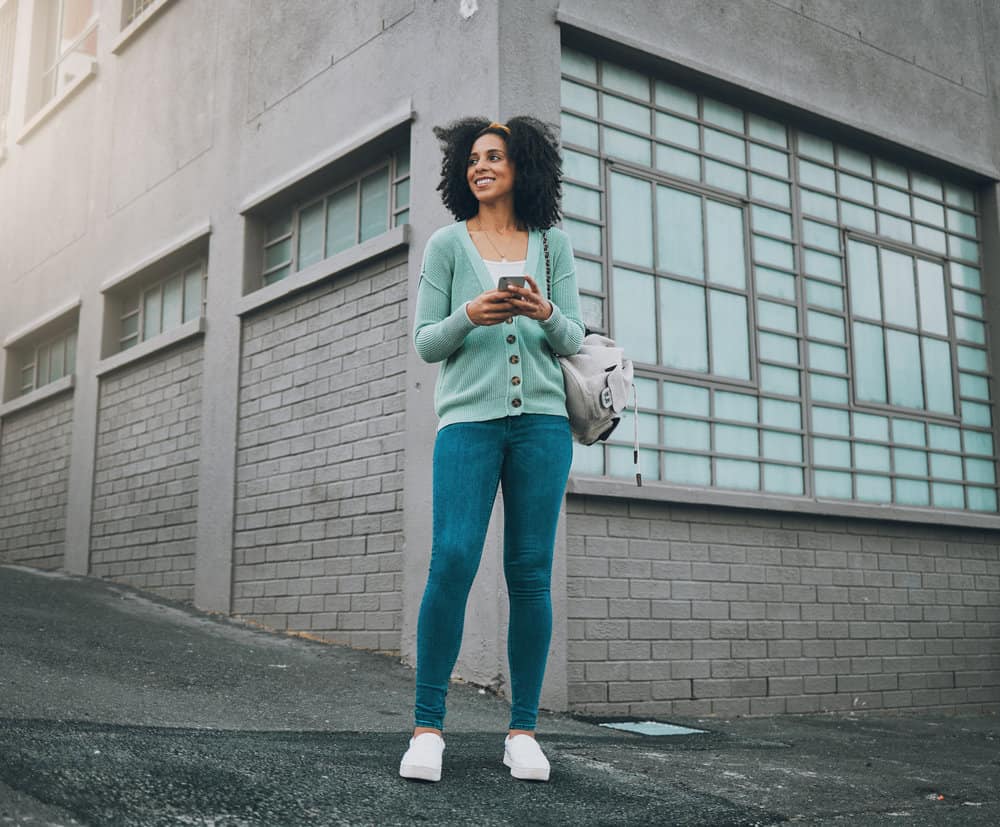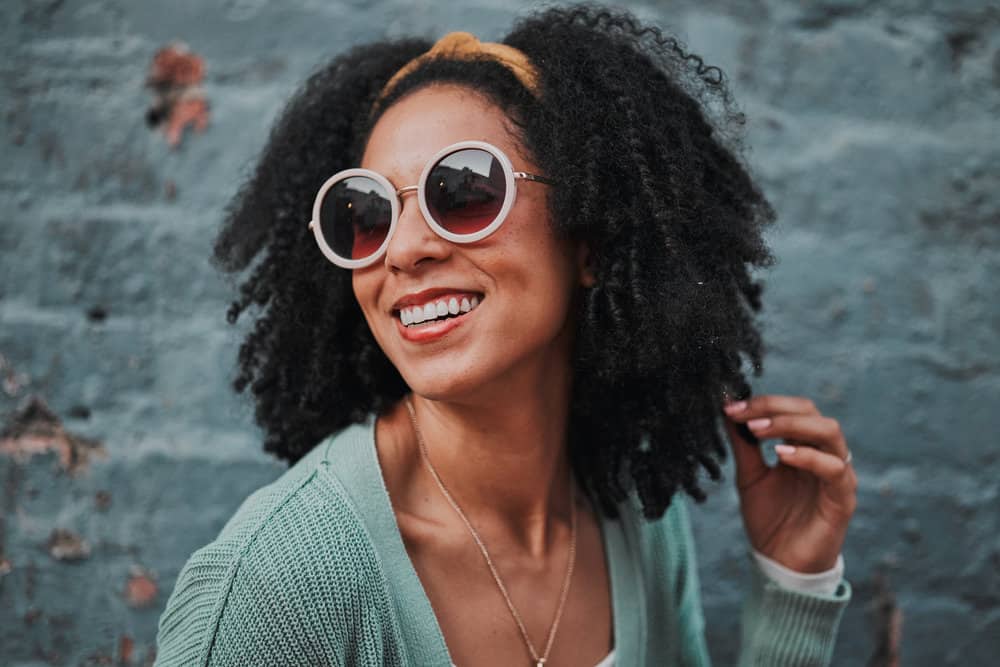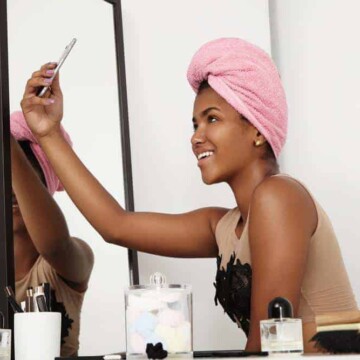
Curly girls and guys all over rejoiced when co-washing became a thing. It started off as a trend that promised folks a more hydrated mane, but now it's a bonafide hair hydration technique countless people turn to in pursuit of their best hair.
But just like with everything else, co-washing has both benefits and drawbacks, and you should know about both before giving it a try. In this article, we'll share the pros and cons of this cleansing method to help you decide if it's right for you.
Table of Contents
- 1 What Is Co-Washing?
- 2 The Pros of Co-Washing for Curly Hair
- 3 The Cons of Co-Washing for Curly Hair
- 3.1 Your Hair May Not Feel Clean
- 3.2 You Could Develop Build-Up with Cleansing Conditioners
- 3.3 The Risk of Moisture Overload
- 3.4 Related Articles
- 3.5 What Is a Co-Wash?
- 3.6 How Often Should You Co-wash?
- 3.7 Is Co-washing Good for Your Hair?
- 3.8 What Is the Difference Between Shampoo and Co-wash?
- 3.9 Can Co-washing Damage Your Hair?
- 3.10 Do You Condition After Co-washing?
- 3.11 Does Co-washing Cause Hair Loss?
What Is Co-Washing?
For those who aren't sure, co-washing is simply the act of using conditioner to wash your hair instead of typical shampoo. You can use a rinse-out conditioner or a commercial co-wash, which contains gentle surfactants to cleanse your hair more deeply than conditioner can.
The principle behind co-washing is that shampoo is too harsh on the hair and causes more problems than it solves. Proponents of co-washing state that the combination of conditioner, water, and scrubbing is able to get their hair as clean as shampoo does.

The Pros of Co-Washing for Curly Hair
Co-washing comes along with a ton of great benefits, which is why so many swear by it. Here are some of the most prominent pros of the hair cleansing method:
Better Hair Hydration
If you've got curls, coils, or kinks, you know how hard it is to keep them moisturized. The twists and turns characteristic of curly hair keep the scalp's oils from doing their job effectively.
On top of that, the average shampoo contains surfactants that strip away oils, debris, and virtually anything else sitting on your strands.
This sounds good in theory, but too much of a good thing is a bad thing in this case. Shampoos are simply too good at cleansing curly hair, leaving it arid, and are prone to breakage and damage.

Through co-washing, you can cleanse your hair without stripping it of all moisture and life. As a result, your hair will retain more moisture and be more resilient in the face of environmental influences and regular hair care and styling.
Enhanced hair moisture levels come with a ton of secondary benefits you should know about. We'll examine each of these in the section below:
- Lower Breakage risk. Co-washing equals a lower risk of breakage since your hair will have improved elasticity. With sufficient elasticity, your hair will stretch for a while before it breaks. Without sufficient moisture, your hair's elasticity will decrease, and your strands will break easier. Since your hair won't be breaking as often, you'll keep more of your length over time and reach your length goals.
- Better-looking hair. What's more, is that moisturized hair looks and feels better. We've all witnessed the dry, dusty cast that develops on thirsty hair; it's enough to ruin your hair and make it more difficult to achieve even the simplest styles. Unstripped, hydrated tresses look and feel softer and more pliable, making styling easier and more rewarding.
- Super-defined curls. Preserving your hair's moisture with co-washing results in better curl definition. In case you weren't aware, hydration in all forms helps to bring out your hair texture. If your hair lacks moisture, your unique curl pattern won't show through as much as it would otherwise. Co-washing can wake up your curls in the best way.

Easier Detangling
Detangling your curls every week or so is a daunting task because when you leave your curls untouched for an extended amount of time, tangles and mats set in.
If you switch to co-washing and do so on a more frequent basis than you currently shampoo, you'll enjoy shorter detangling sessions. Why?
Because you won't go as long between them.
Even if you don't co-wash your hair more often than you would shampoo it, since co-washing your hair leaves it softer and more pliable, you'll have an easier time working out those knots and tangles.

Freedom to Wash Your Hair More Often
Sometimes people with curly hair are instructed not to wash their hair often. This is because of the harshness of shampoo and the inherent dryness of curly hair.
But if you switch to a cleansing conditioner or cold wash, which is gentler than shampoo, you can wash your hair as often as you like-within reason, of course.
This is great news for people who have trouble going a week between wash days.
Less Money Going Toward Your Hair Product Stash
If you currently don't co-wash, you probably have quite a few hair moisturizing products in your arsenal. And if you don't, chances are you have to use a large amount of the products you do have to keep your hair moisturized.
With a regular co-washing routine, you won't need a ton of different moisturizers, serums, or hydrating treatments.
You don't need an extensive number of hair hydrators or handfuls of products to get the results you're going for. Your hair will be moisturized from the moment you step out of the shower.

The Cons of Co-Washing for Curly Hair
By this point, you probably think that co-washing is your ticket to amazing hair. In many cases, this will be true. But before making your decision, let's get into the drawbacks of co-washing. That way, you'll be able to make a well-rounded decision.
Your Hair May Not Feel Clean
One of the main complaints people have about co-washing is that even after washing their hair thoroughly with their co-wash, their hair still feels dirty. The thing you should understand about co-washes is that they don't have many of the harsh surfactants typical shampoos have.
It's, for this reason, your hair won't feel squeaky clean after a co-washing session. This is a con for people who are used to their hair being squeaky clean after a wash. It may even be a deal breaker.

You Could Develop Build-Up with Cleansing Conditioners
Yes, commercial co-washes do contain cleansers and surfactants. But since they are very gentle, it's 100% possible that product residues can be left behind.
When that happens, and you don't catch it in time, your strands can become weighed down with the remnants of your hair products.
If the buildup isn't removed in a timely manner, it can accumulate to the extent that it keeps moisture from getting into your hair. The result, of course, is dry hair.
Luckily, there's an easy remedy for this.
Every now and again, you should wash your hair with a clarifying shampoo. Once a month or so is a good frequency to start with. Since you won't be washing your hair with shampoo most of the time, you'll still reap the benefits of co-washing your hair.

The Risk of Moisture Overload
We all know it's a bad idea to overwash your hair or to use products that strip away all the moisture. But did you know your hair could become over-moisturized?
That usually happens when you co-wash your hair too often or fail to update your hair moisturizing routine after switching to co-washing. You may have moisture overload if your strands have become gummy to the touch, take a very long time to dry, or are just limp overall.
To reduce your risk of developing moisture overload, you should always pay attention to how your hair behaves after a wash. It also helps to ensure that your hair is completely wet before going to bed.
If you notice signs of moisture overload, hold back on the moisture a bit.

What Is a Co-Wash?
Co-washing, short for conditioner washing, is a hair care technique that involves using a cleansing conditioner instead of a traditional shampoo to clean the hair. The cleansing conditioner gently removes dirt and buildup from the hair while providing moisture and nourishment to keep the hair healthy and hydrated. Co-washing is particularly popular among individuals with curly, coily, or kinky hair.
How Often Should You Co-wash?
Some people co-wash daily, while others may only co-wash once or twice a week. Co-washing is a gentler alternative to traditional shampooing and can be done more frequently without stripping the hair of its natural oils. However, it's important to pay attention to how your hair responds to co-washing and adjust the frequency as needed to maintain healthy, balanced hair.
Is Co-washing Good for Your Hair?
Co-washing can be good for your hair, particularly if you have curly hair. Traditional shampoos strip the hair of its natural oils, leaving it dry and prone to damage. Co-washing, on the other hand, is a gentler alternative that keeps the hair moisturized and hydrated while removing dirt and buildup. Co-washing also helps to reduce frizz and improve curl definition.
What Is the Difference Between Shampoo and Co-wash?
The main difference between shampoo and co-wash is that shampoo is designed to remove dirt, oil, and buildup from the hair, while co-wash is designed to gently cleanse the hair while providing moisture and nourishment. Shampoo is often formulated with harsh detergents that can strip the hair, and co-wash is formulated with mild, moisturizing ingredients.
Can Co-washing Damage Your Hair?
Co-washing is a gentle and nourishing alternative to traditional shampooing and is unlikely to cause damage to the hair when done correctly. Choose a high-quality cleansing conditioner that is specifically designed for your hair type, and avoid using too much product or leaving the product on the hair for too long, as this can lead to buildup and other issues.
Do You Condition After Co-washing?
Conditioning after you co-wash is optional and depends on your hair type and personal preference. Co-washing is designed to provide both cleansing and conditioning benefits, so you may not need to use a separate conditioner after co-washing. Although, you might want to if you have particularly dry or damaged hair or if you want to add extra moisture and nourishment.
Does Co-washing Cause Hair Loss?
Co-washing is not known to cause hair loss. In fact, co-washing can be a gentler and more nourishing alternative to traditional shampooing, which can strip the hair of its natural oils and lead to dryness and breakage. Pay attention to how your hair and scalp respond to co-washing and adjust your routine as needed to maintain healthy, balanced hair.
So there you have it-everything you need to know about the pros and cons of co-washing your hair. We hope you found all the information you were looking for, and we encourage you to give co-washing a try if it sounds interesting. Good luck!




